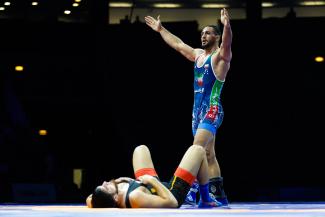Three Rio Champions Remain on Course to Do Olympic Double
Wednesday, August 4, 2021 - 08:03 By Vinay Siwach

CHIBA, Japan (August 4) --- Hassan YAZDANI (IRI), Risako KAWAI (JPN) and Helen MAROULIS (USA) remained on course to repeat their gold-winning performance from the Rio Olympics as all three reached the semifinals of their respective weight categories at the Tokyo Olympics.
But for Kawai and Maroulis, only one will get the chance to do the double as both face each other in the semifinal.
On Wednesday, freestyle 57kg and 86kg and women's 57kg weight class were in action which was nothing short of breathtaking. The 2019 world champions Yazdani and Kawai dominated their opponents to make place in the last four.
At 57kg, another 2019 world champion Zaur UGUEV (ROC) survived two agonizingly close bouts to make it to the semifinals against Reza ATRI (IRI). The other semifinal will see 2019 World Championships bronze medalists Ravi KUMAR (IND) and Nurislam SANAYEV (KAZ).
The Makuhari Messe Hall A was witnessed a wrestling session worthy of highlight reel with the skills of highest order causing upsets, falls, technical superiority and thrillers.

The first one came in the first round of 57kg when Uguev trailed 2017 World silver medalist Thomas GILLMAN (USA) 4-3 with less than 15 seconds to go. Gillman was defending a single leg attack but as the clock neared the six minute mark, he surrendered the lead, handing a 5-4 win to the ROC athlete.
He followed that with another stunning victory over Gulomjon ABDULLAEV (UZB) using an inside trip in the final three seconds to win 6-6. Abdullaev scored a takedown at the edge to lead 6-4 and Uguev had all but given up.
But when the wrestlers came to center, he glanced at the clock to see that there was enough time for him to pull out one more trick. He went for his go-to duck under. With Abdullaev stepping outside to defend that, Uguev transitioned it into an inside trip and two points.
He will face Atri in the semifinal who upset two World medalist in the first two bouts. First was 2019 World silver medalist Suleyman ATLI (TUR). Atri scored a 3-2 win over the Turk wrestler. In the second bout, he was in more control, beating Bekhbayar ERDENEBAT (MGL) 5-1.
Sanayev began with a 7-0 win over Diamantino IUNA FAFE (GBS) and set up a quarterfinal against 2017 world champion Yuki TAKAHASHI (JPN). He led 4-4 on criteria and then decided to defend the lead but Takahashi challenged for a singlet-grab. But the judges did not confirm and he lost the challenge. Interestingly, no point was awarded to Sanayev for the lost challenge.
Kumar from India had two wins by technical superiority. He defeated Oscar TIGREROS URBANO (COL) 13-2 and then won 14-4 against Georgi VANGELOV (BUL).
 David TALOR (USA) reached the semifinals at 86kg. (Photo: United World Wrestling)
David TALOR (USA) reached the semifinals at 86kg. (Photo: United World Wrestling)
At 86kg, Yazdani is on the track to face David TAYLOR (USA) in the final as both reached the semifinals. Giving up only three points in two points and scoring 25, Yazdani began with a 13-2 win over Javrail SHAPIEV (UZB) and then a 12-1 mauling of Stefan REICHMUTH (SUI).
He will face Artur NAIFANOV (ROC) in the semifinal. Yazdani had pinned Naifanov at the 2019 World Championships. But the ROC athlete looked in different touch in Chiba as he defeated Boris MAKOEV (SVK) 6-0 and then beat Osman GOCEN (TUR) 12-1.
In women's wrestling, Kawai set up a semifinal blockbuster with Rio Olympic champion Helen MAROULIS (USA). The two looked in the league of their own as Maroulis knocked off Ningning RONG (CHN) in the opening bout 8-4. She avenged her loss from Poland Open against Tetyana KIT (UKR), beating her 8-0.

The USA wrestler is one of the few who can say they have beaten the legendary Saori YOSHIDA (USA). She achieved that feat in Rio when she stunned the three-time Olympic gold medalist to become USA's first female wrestler to win gold.
This time she has Kawai standing in that path. Kawai had similar victories, beating Fatoumata Yarie CAMARA (GUI) 8-2 and then moving past Khongorzul BOLDSAIKHAN (MGL) 7-0.
From the other side, Iryna KURACHKINA (BLR) and Evelina NIKOLOVA (BUL) emerged as semifinalists.
Kurachkina secured an 8-2 win over Anshu MALIK (IND) and then defeated Rio Olympics silver medalist Valeria KOBLOVA (ROC) 6-3 to reach the semifinal. Her constant pressure and defence made it difficult for the opponents to find an opening from where they could score.
Nikolova was the surprise winner from the side which had Odunayo ADEKUOROYE (NGR) and Anastasia NICHITA (MDA). But the Bulgarian showed up in style against Nichita in the quarterfinal and secured a fall over her.
Earlier, Nichita stunned Adekuoroye with a fall despite trailing 0-8. That win should have made Nichita the favourite but she suffered a fall in the next bout.


Share your thoughts.
Comments